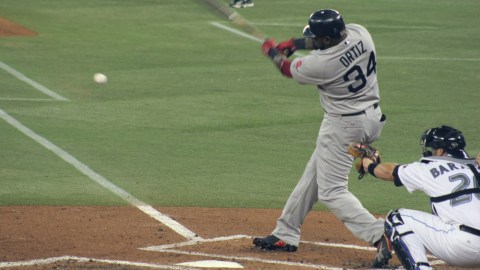Lessons from a Game Designed to Break Your Heart

“It breaks your heart. It is designed to break your heart.” In his essay, “The Green Fields of the Mind,” the late Commissioner of Major League Baseball and Yale president A. Bartlett Giamatti added a poetic touch to a simple observation about the schedule of the baseball season and the cycle of nature:
“The game begins in the spring, when everything else begins again, and it blossoms in the summer, filling the afternoons and evenings, and then as soon as the chill rains come, it stops and leaves you to face the fall alone.”
Spoken like a true Red Sox fan.
Giamatti never lived to see his beloved Red Sox win the World Series, but his team is now playing to win their third World Series of the 21st century. As is always the case in Boston, there will be more at stake than just baseball. Especially this year, after the Boston Marathon bombings. If that terrorist attack was an assault on democracy itself, then baseball might just offer the best opportunity for redemption in the city that prides itself on being the cradle of American democracy. Fittingly, throughout the playoffs and into the World Series, the grounds crew at Fenway Park has mowed a “Boston Strong” message into the outfield grass.
Even if you don’t care who wins this year’s Fall Classic – in which the Sox face off against another storied franchises, the St. Louis Cardinals – I would argue that this cultural tradition, with all its fatalism and tragic allure, along with its promise of redemption and renewal, is nonetheless somewhere embedded in your psyche, at least if you are an American.
After all, our national literature, ever since the game came to national prominence in the late 19th century, is obsessed with baseball – from Mark Twain to Sinclair Lewis to Ernest Hemingway and F. Scott Fitzgerald to Philip Roth. If you wanted a seat at the famed Algonquin Round Table in the 1920s, you needed to be able to match the wits of Dorothy Parker, enjoy a gin martini or two, and know your baseball.
As Cordelia Candelaria and others have documented, the mythic status of baseball as the nation’s pastime was created by American writers who absorbed the game’s wisdom and found in it the unique expression of the American character.
The wisdom of baseball can be found in the most famous baseball poem of the 19th century, Ernest Lawrence Thayer’s Casey at the Bat, in which the hero steps to the bat with a chance to win the game…
Oh, somewhere in this favored land the sun is shining bright;
The band is playing somewhere, and somewhere hearts are light,
And somewhere men are laughing, and somewhere children shout;
But there is no joy in Mudville – mighty Casey has struck out.
The wisdom of baseball can be found in The Great Gatsby, in which we meet a shady character named Meyer Wolfsheim, based on the real-life crime boss Arnold Rothstein. Rothstein is believed to have fixed the 1919 World Series, an act that Fitzgerald says destroyed “the faith of fifty million people.”
And yet, while the game may be designed to break our hearts…
We love baseball the most due to the game’s redemptive qualities, which I think were best expressed by the most optimistic of American poets, Walt Whitman, who saw in baseball the potential to “relieve us from being a nervous, dyspeptic set, repair those losses and be a blessing to us.”
Play ball!
Image courtesy of Shutterstock





